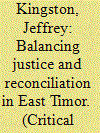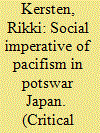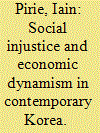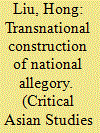|
|
|
Sort Order |
|
|
|
Items / Page
|
|
|
|
|
|
|
| Srl | Item |
| 1 |
ID:
073641


|
|
|
|
|
| Publication |
2006.
|
| Summary/Abstract |
As East Timor emerges from a long Indonesian nightmare, it is seeking to balance the agendas of justice and reconciliation. The verdict on justice for East Timor is one of disappointment. The main obstacle to accountability is Indonesia, abetted by an international community that seeks its assistance in the "war on terror." East Timor's leaders have emphasized reconciliation while promoting a healing process and good governance. Recent violence reveals just how difficult this task remains. The hybrid tribunal established in East Timor by the UN was once heralded as an important innovation in transitional justice, avoiding the high cost and lengthy proceedings of other international tribunals. However, the tribunal has been unable to hold accountable those who bear the greatest responsibility for outrages committed against Timorese and defendants did not get fair trials or competent defense. A truth commission report released in December 2005, Chega! (Enough), emphasizes justice and reparations. The political leadership soft peddles justice because they believe this makes more sense and will better serve the people. Indonesians are now being given a chance to testify in front of the Commission of Truth and Friendship (CTF), but concern is widespread concern that the CTF emphasizes reaching closure, has no judicial mandate, and only ensures impunity for ranking perpetrators. Indonesia and East Timorese can regain dignity and move beyond their shared tragedy through a process of reconciliation that is based on justice and atonement. Germany shows this is possible; Japan, that it is difficult and problematic if neglected.
|
|
|
|
|
|
|
|
|
|
|
|
|
|
|
|
| 2 |
ID:
073643


|
|
|
|
|
| Publication |
2006.
|
| Summary/Abstract |
This dialogue develops a series of reflections on contemporary Chinese politics starting from Wang Hui's analysis of the role that the repression of the spring 1989 movement played in the acceleration of China's neoliberalist economic policies, and more in general about the peculiar forms of intervention of the party-state in the implementation of capitalist forms of economy. Four major issues are discussed: some probings of the political value of the Tiananmen movement; the suppression of the agricultural people's communes; the parallel transformation of the industrial danwei system; and the rise of Deng Xiaoping's strategy as a form of reactive subjectivity toward the political experiments of the late sixties and early seventies. The authors argue that the major consistency in the Chinese state today is the process of harsh depoliticization of subjectivities deployed during the Cultural Revolution, and retrospectively throughout the entire twentieth century in China. On the other hand, this process of depoliticization shows a weakness in consistency, since it basically depends on a "radical negation" and, in the end, lacks autonomous subjective strength.
|
|
|
|
|
|
|
|
|
|
|
|
|
|
|
|
| 3 |
ID:
073642


|
|
|
|
|
| Publication |
2006.
|
| Summary/Abstract |
Postwar Japanese history is often analyzed from the perspective of peace and democracy. Both ideas represented an interpretation of the war experience on the part of postwar progressive thinkers that saw postwar pacifist activism assume an anti-State character. But another important part of this intellectual context was its pro-society inclination. Social agency and autonomy became the main objectives of postwar progressive thinking, and it was this that drove the intellectual activism and advocacy of postwar pacifist movements. But how did intellectuals conceptualize society, and what were the consequences of this conceptualization for the actual development of pacifist movements? Through examining the intellectual leadership of postwar pacifist movements we can begin to appreciate how the peace-democ-racy paradigm actually worked. A pioneering thinker in this respect was Shimizu Ikutar?, who was a central figure in Japanese pacifism in the 1950s, and a leading activist in the first anti-base movement at the village of Uchinada in 1953-54. It was in the context of this movement that Shimizu developed and articulated his ideas about society and peace. In the process, he revealed the dissonance in his thinking concerning "commoners," and commenced his own intellectual disintegration as a progressive thinker. The consequences of the Uchinada protest for postwar popular and intellectual movements for peace would be formative, eventually leading to the cataclysm of the failed anti-security treaty movement of 1960.
|
|
|
|
|
|
|
|
|
|
|
|
|
|
|
|
| 4 |
ID:
073640


|
|
|
|
|
| Publication |
2006.
|
| Summary/Abstract |
This article examines the processes of labor market restructuring and welfare reform in South Korea since the 1997/98 crisis, arguing that the Korean state-capital complex has succeeded in effecting a substantial redistribution of income from labor to capital. This redistribution of income has played a critical role in enhancing Korea's international competitiveness and in facilitating a return to sustained growth. The principal mechanisms through which this redistribution has been achieved are the intensified exploitation of weaker sections of the proletariat and the reduction of the traditionally more protected organized sections of the workforce in major firms. At the same time, the state has strengthened welfare safety nets and sought to place concerns about structural competitiveness at the heart of the welfare regime through the promotion of vocational training. What has been most striking about the process of welfare reform, however, has been the capacity of the state to limit the growth of welfare expenditures/provision whilst simultaneously creating massive new labor market insecurities. As a result of the success of the Korean state in restructuring labor markets in order to effect a redistribution of income from weaker sections of the proletariat to capital and limiting the growth of social spending we have witnessed a marked increase in inequality since 1997. Korea's apparent success in transforming itself into a competitive, dynamic neoliberal economy must, therefore, be understood as being symbiotically linked to the intensification of inequality.
|
|
|
|
|
|
|
|
|
|
|
|
|
|
|
|
| 5 |
ID:
073639


|
|
|
|
|
| Publication |
2006.
|
| Summary/Abstract |
"The story of the private individual destiny," declares Fredric Jameson, "is always an allegory of the embattled situation of the public third-world culture and society." Using the case of China's involvement in the cultural politics of postcolonial Indonesia, this essay examines the transnational dynamisms of the making of a national allegory and discusses the production and reception of the China images in Sukarno's Indonesia (1949-65), with a focus on the PRC's cultural diplomacy and how Chinese literary principles were appropriated and domesticated, subsequently constituting an integral component of Indonesian cultural politics. Arguing that the narratives about China (both as a sociopolitical entity and a cultural symbol) served as an important transnational inspiration to public deliberations and cultural polemics-thus contributing to the formation of national allegories in postcolonial Indonesia, this essay takes the Jamesonian thesis a step further by suggesting that a transnational imaginary within Third World countries plays a significant part in the making of domestic literary politics. This essay may also be taken as an exercise in going beyond the nation-state-centric historiography that has been the defining characteristic of Asian Studies and pointing to the need to study Sino-Southeast Asian relations from the angle of cultural politics and its intertwining ambiguities with conventional diplomacy.
|
|
|
|
|
|
|
|
|
|
|
|
|
|
|
|
|
|
|
|
|